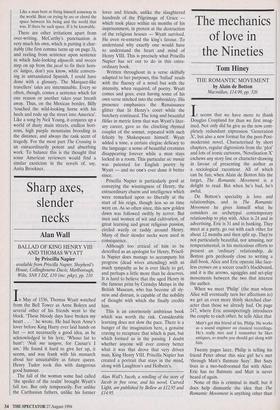Sharp axes, slender necks
Alan Wall
BALLAD OF KING HENRY VIII AND THOMAS WYATT by Priscilla Napier available from Priscilla Napier, Shepherd's House, Collingboume Ducts, Marlborough, Wilts, SN8 3 DZ, £10 (inc. p&p), pp. 210 BALLAD OF KING HENRY VIII AND THOMAS WYATT by Priscilla Napier available from Priscilla Napier, Shepherd's House, Collingboume Ducts, Marlborough, Wilts, SN8 3 DZ, £10 (inc. p&p), pp. 210 In May of 1536, Thomas Wyatt watched from the Bell Tower as Anne Boleyn and several other of his friends went to the block. 'These bloody days have broken my heart . . . ' he wrote. He had been Anne's lover before King Harry ever laid hands on her — not necessarily a good idea, as he acknowledged in his lyric, Whoso list to hunt': Woli me tangere, for Caesar's I am.' He found it hard to give her up, it seems, and was frank with his monarch about her unsuitability as future queen. Henry Tudor took this with dangerous good humour.
The fall of the woman some had called `the spoiler of the realm' brought Wyatt's fall too. But only temporarily. For unlike the Carthusian fathers, unlike his former lover and friends, unlike the slaughtered hundreds of the Pilgrimage of Grace which took place within six months of his imprisonment, in protest at the destruction of the religious houses — Wyatt survived. He even re-entered the king's favour. To understand why exactly one would have to understand the heart and mind of Henry VIII. This is precisely what Priscilla Napier has set out to do in this extra- ordinary book.
Written throughout in a verse skilfully adapted to her purposes, this 'ballad' reads with the fluency of a novel but with the intensity, when required, of poetry. Wyatt comes and goes, even having some of his own verse stitched into the embroidery. His presence emphasises the Renaissance glitter that lit Henry's court while the butchery continued. The long and beautiful Helas in metric form that was Wyatt's liter- ary career, gave us the clinching rhymed couplet of the sonnet, repeated with such felicity by Shakespeare himself. Wyatt added a tone, a certain elegiac delicacy to the language: a sense of beautiful creatures disappearing forever while a man stays locked in a room. This particular sic transit was patented for English poetry by Wyatt — and no one's ever done it better since.
Priscilla Napier is particularly good at conveying the winningness of Henry, the extraordinary charm and intelligence which were remarked upon so liberally at the start of his reign, though less so as time went on. As so often since, this new golden dawn was followed swiftly by terror. But men and women of wit and cultivation, of great learning and great religious passion, circled warily or rashly around Henry. Many of their slender necks were axed in consequence.
Although too critical of him to be described as an apologist for Henry, Priscil- la Napier does manage to accompany his progress (dead wives attending) with as much sympathy as he is ever likely to get, and perhaps a little more than he deserves. It is hard to believe that the aged Henry in the famous print by Cornslys Matsys in the British Museum, who has become all sly- ness and distrust, is capable of the nobility of thought with which she finally credits him.
This is an enormously ambitious book which was worth the risk. Considerable learning does not slow the pace. There is a hunger of the imagination here, a genuine craving to recapture that which is past, but which formed us in the passing. I doubt whether anyone will ever convey better what it was that drove that very driven man, King Henry VIII. Priscilla Napier has created a portrait that stays in the mind, along with Laughton's and Holbein's.
Alan Wall's Jacob, a retelling of the story of Jacob in free verse, and his novel, Curved Light, are published by Bellew at £12.95 and £14.95.


























































 Previous page
Previous page